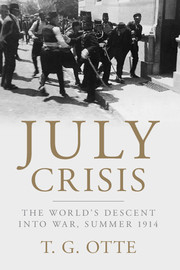Book contents
- Frontmatter
- Dedication
- Contents
- List of illustrations
- List of maps
- Preface and Acknowledgements
- List of abbreviations
- List of the principal dramatis personae
- Europe, 1914
- The Balkans, 1914
- Introduction
- 1 Prelude: the road to Sarajevo
- 2 Sarajevo and its echoes: 28 June to 5 July
- 3 The triumph of tactics over strategy: 6 to 21 July
- 4 Localizing the crisis: 19 to 23 July
- 5 The ultimatum: 23 to 26 July
- 6 Localizing the war: 26 to 28 July
- 7 Escalation: 29 July to 4 August
- Conclusion
- Index
- Plate section
- References
6 - Localizing the war: 26 to 28 July
Published online by Cambridge University Press: 05 July 2014
- Frontmatter
- Dedication
- Contents
- List of illustrations
- List of maps
- Preface and Acknowledgements
- List of abbreviations
- List of the principal dramatis personae
- Europe, 1914
- The Balkans, 1914
- Introduction
- 1 Prelude: the road to Sarajevo
- 2 Sarajevo and its echoes: 28 June to 5 July
- 3 The triumph of tactics over strategy: 6 to 21 July
- 4 Localizing the crisis: 19 to 23 July
- 5 The ultimatum: 23 to 26 July
- 6 Localizing the war: 26 to 28 July
- 7 Escalation: 29 July to 4 August
- Conclusion
- Index
- Plate section
- References
Summary
The initial fright at this war that no-one had wanted, not the peoples, not the government – this war, which had slipped out of the clumsy hands of the diplomats, who had played and bluffed with it – had turned into sudden enthusiasm.
STEFAN ZWEIG (1944)Giesl’s departure from Belgrade and the severing of diplomatic relations between the Monarchy and Serbia created a new situation in Europe. From the beginning of the Sarajevo crisis, Berchtold later argued, Vienna’s aim had been to coerce the Serbian government into giving both a guarantee that the assassination plot would be thoroughly investigated, and, to reinforce it, a pledge to refrain in future from any anti-Habsburg activities. Belgrade’s reply to the démarche offered nothing of the kind, as Giesl confirmed personally when he called on Berchtold and his senior officials at the Ballhausplatz at 4 p.m. on 26 July. The envoy’s declaration, Berchtold recalled, was decisive: ‘practically nothing had been achieved with the Serbian move and that everything would remain unchanged . . . It would have meant deceiving ourselves had we accepted an apparent but in concreto useless success.’
It must be doubted whether Giesl’s pronouncement was indeed key to decision-making at Vienna. Austria-Hungary’s last envoy to Serbia had merely done what he had been told to do. But Berchtold was satisfied that the breach with Belgrade bore Giesl’s imprimatur. ‘None of us’, one of the officials at the Ballhausplatz explained, ‘could have done it; only a soldier could do it’. Giesl’s profound knowledge of the Balkans and the Southern Slav peoples – he was married to a Serbian lady – also offered a convenient umbrella for protection against current and later criticism. Berchtold himself had worked purposefully towards conflict with Serbia, a third Balkan war that would roll back the recent expansion of the neighbouring kingdom and reassert Austria-Hungary’s beleaguered position and waning influence in the region. The ‘tunnel vision’ of the Habsburg leadership was exclusivly focused on this single object, the diminution, if not outright destruction, of Serbia.
- Type
- Chapter
- Information
- July CrisisThe World's Descent into War, Summer 1914, pp. 286 - 369Publisher: Cambridge University PressPrint publication year: 2014



